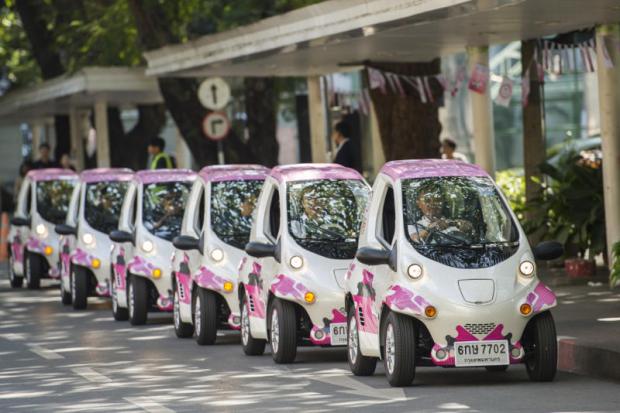
Japanese carmaker Toyota Motor Thailand has kicked off its car-sharing model in Bangkok, aiming to study motorist behaviour in the capital over the next two years.
Bangkok has been chosen as the second foreign city after Grenoble, France for Toyota's "Ha:mo" project, which stands for harmonious mobility network.
In Japan, Ha:mo operates in four locations: Toyota City, Tokyo, Okayama and Okinawa.
Toyota teamed up with Chulalongkorn University to launch its car-sharing model to be used intra-campus, with an investment budget of 50 million baht.
There are 10 ultra-compact electric cars called Toyota Coms in use, with another 20 expected to be imported from Japan by the second quarter of next year. Toyota Coms have a top speed of 60 kilometres per hour, a range of 50km and take six hours to charge fully.
Toyota Coms cost 280,000 baht and can be registered with the Land Transport Department.
The partners provided 12 electric car stations on Chulalongkorn's campus, connecting with Bangkok's mass transit system at the National Stadium BTS station and Sam Yan MRT station, along with 10 charging stations and 33 parking lots.
Ninnart Chaithirapinyo, chairman of the board at Toyota Thailand, said the company and Chulalongkorn University will add another 15 charging stations next year to connect Ha:mo to more mass transit points such as Siam BTS station.
"Toyota has joined hands with Chulalongkorn as this area sees 100,000 people per day, so there is are plenty of opportunities for car-sharing demand because of insufficient parking lots and expensive parking fees," he said.
"Our phase-one timeline is December 2017-November 2019 to study and research user behaviour, while the second phase will commercial, with involvement from interested partners to invest and expand operations," he said.
Mr Ninnart said the project began on Dec 1 and has over 300 members.
Since the initial service was launched, there have been 311 usage instances and the average usage rate is about 45 times per day. Normally, the peak usage times are 11am-1pm and 3pm-5pm.
Each member can register via its mobile application for a 100 baht fee, which gets 100 usage points. The service fee is 30 baht for 20-minutes of driving and after the first 20 minutes it will cost 2 baht per minute. Members must pay by debit or credit card.
The service days are Monday to Friday between 7am-7pm.
Mr Ninnart said Toyota aims to provide its findings on user response to the car-sharing model and outline related regulations that the government has to revise to accommodate this trend.
Moreover, the revenue from this project will be directed to promote innovative platforms and encourage participation from individuals to develop technology in the future, he said.
"Autonomous driving in Chulalongkorn is a top priority platform that Toyota wants to conduct research on," said Mr Ninnart.